【SIPA】SJTU-Yale Bilateral Forum on Global Public Health Policy Research Directions Successfully Held
May 25, 2020
On May 24, the SJTU- Yale Bilateral Forum on Global Public Health Policy Research Directions was successfully held at Xuhui campus, Shanghai Jiao Tong University. Guests from the National Health Commission and Yale University participated the forum through the internet.
The forum is hosted by Shanghai Jiao Tong University and Yale University, and organized by SJTU-Yale Joint Center for Health Policy, Yale School of Public Health, SJTU Institute of Health Yangtze River Delta and SJTU School of International and Public Affairs.
CHEN Ningshan,Deputy Director of the Department of Law and Policy, the National Health Commission; Pericles Lewis, Yale Vice President for Global Affairs; ZHAO Dandan, Vice Director, Shanghai Municipal Health Commission; XU Xuemin, SJTU Vice President for International Affairs; YIN Shankai, President and CEO, the Sixth Hospital Affiliated with SJTU; StenVermund, Dean of Yale School of Public Health; Paul D. Cleary, the Anna M.R. Lauder Professor, Yale School of Public Health; ZHAO Hongyu, Chair of Yale Department of Biostatistics; HU Jin, Acting Dean, SJTU School of International and Public Affairs; YU Guangjun, President and CEO, Children’s Hospital affiliated with SJTU; ZHENG Ning, President, the Chest Hospital affiliated with SJTU; LUO Peng, Director of SJTU International Affairs Division ;YIN Shankai, President and CEO, the Sixth Hospital Affiliated with SJTU; REN Xuelei, Director,Xuhui Government Commission of Health; WANG Hui, Dean, SJTU School of Public Health ; JIANG Wenning, Director of Council Committee, SJTU School of International and Public Affairs; CHEN Ke, Associate Director of SJTU International Affairs Division; GU Hongchen, Vice Dean, SJTU School of Biomedical Engineering; ZHANG Lufa, Executive Dean, SJTU Institute of Health Yangtze River Delta; ZHANG Zhiruo, Professor, SJTU School of Public Health; QIAN Hanzhu, fellow, Yale School of Public Health and CHEN Xi, Assistant Professor, Yale School of Public Health participated the meeting and witnessed the establishment of the Council of SJTU-Yale Joint Center for Health Policy.
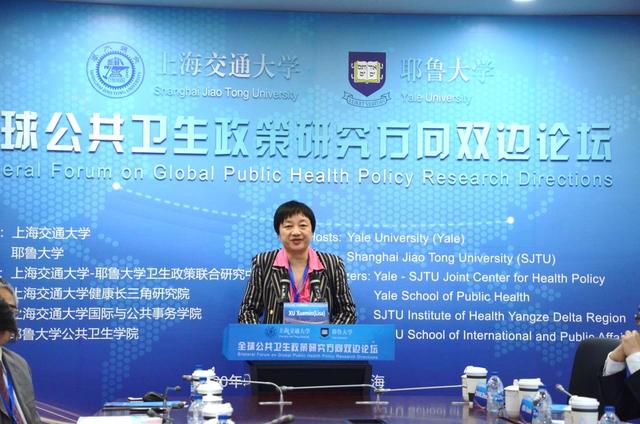
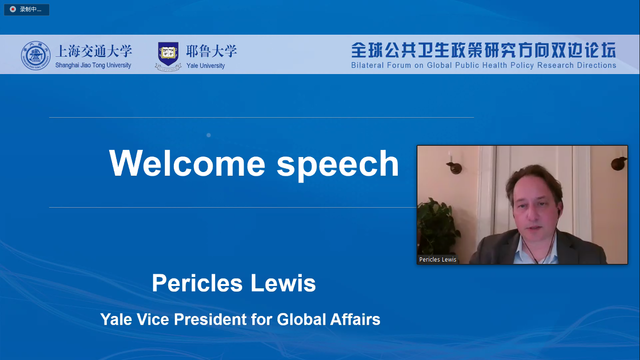

As the moderator, JIANG Wenning gave a short opening remark, followed by welcome speeches from XU Xuemin and Pericles Lewis. Xu pointed out that facing the global public health crisis caused by Covid-19, this bilateral forum on public health research directions is of great significance. The successful holding of this forum also benefits from the long-term cooperation between the two universities. The SJTU-Yale Joint Center for Health Policy has made comments on the transmission, prevention and control of the pandemic at CGTN or Shanghai TV stationsfor over 30 times in the passing months. SJTU-Yale Joint Center for Biostatistics and SJTU-Yale Joint Institute for Immunology have also achieved fruitful outcomes.She called on scholars in the field of public health policy in the two universities to work together and strengthen exchanges to contribute tobuilding a global public health management system. Pericles Lewis firstly congratulates China on its periodical victory in fighting the epidemic, and briefly reviews the long-term and fruitful cooperation between Yale University and Shanghai Jiao Tong University. He also put forward direction suggestions for public health policy research of China and the United States in the future, and wishes this bilateral forum a complete success.
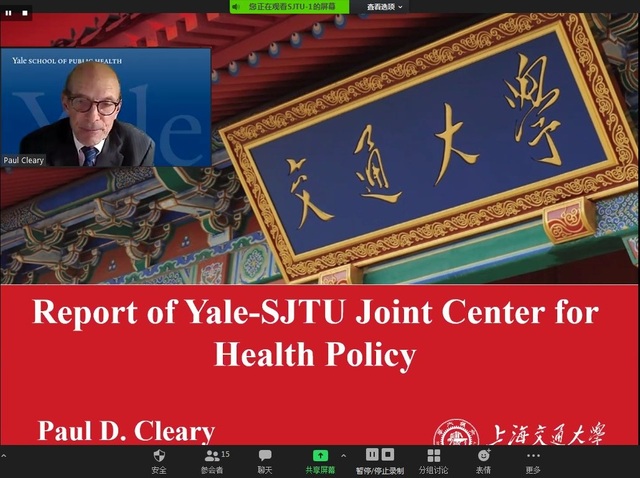
Paul D. Cleary, on behalf of the joint center, gave a development report on the forum.
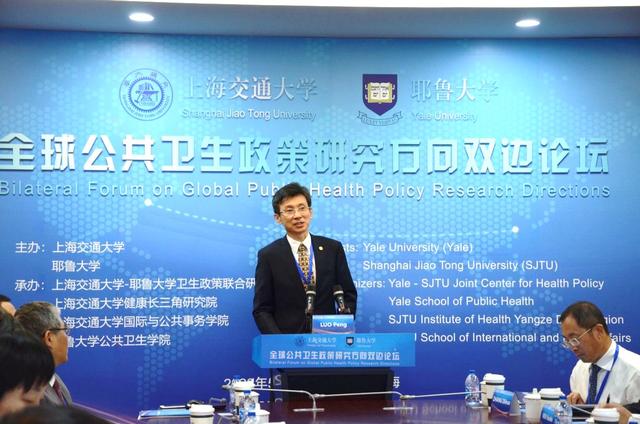
LUO Peng announced the Council Committee of SJTU-Yale Joint Center for Health Policy. XU Xuemin was appointed as the director and ZHAO Dandan as the research fellow.
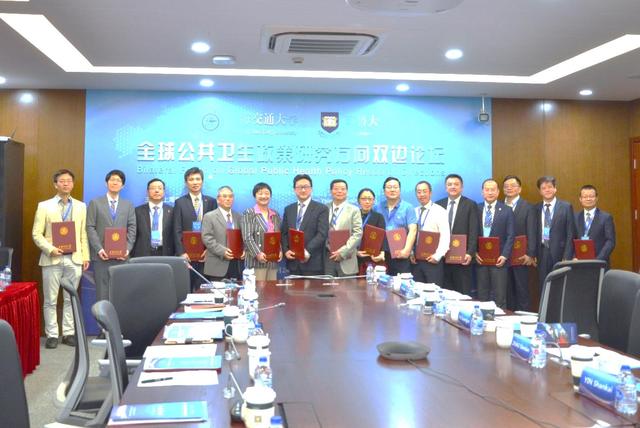
Followingthe opening ceremony was apanel discussiontitled“World Public Health System in the Future” moderated by ZHAO Hongyu. Considering the COVID-19 pandemic, the discussion focused on how best to learn from each other and coordinate policy analyses and initiatives related to public health emergencies in the US and China; to explore the development of a public health management system that can be adapted for use in other countries. The goal of the panel discussion is to explore and identify research directions and specific bilateral cooperation projects.
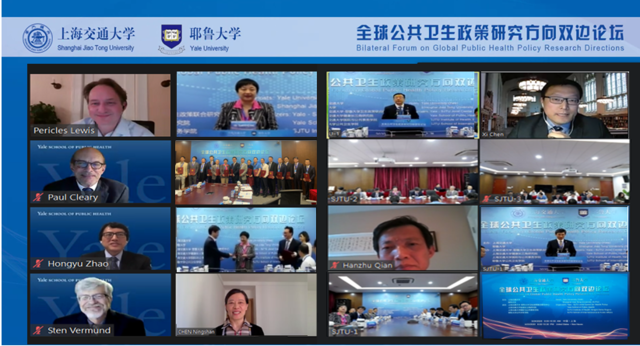
Sten Vermund firstly shares the US’s experience in fighting the epidemic, and ZHAO Dandan shared the experience of China, including strong social organization and social mobilization ability, self- discipline of the public and compliance with the requirements of epidemic prevention, a relatively complete public health service system established after SARS, a sense of collectivism supported by all sides, scientific research and judgment, practical and realistic counter measures from the government and the noble quality of boundless love and benevolence of medical staff. In order to prevent major public health emergencies in the future, Paul Cleary said that countries around the world need to increase information exchanges on the epidemic and jointly deal with the new global epidemic. YIN Shankai stressed that hospitals need to pay attention to the medical material reserve for both peace time and wartime use and emergency mechanism. Wang Hui pointed out that the role of information technology and big data in epidemic control should be valued and better applied. CHEN Xi hoped China and the United States could strengthen in-depth cooperation in public health personnel training in the future. Sten Vermund, YU Gugangjun, ZHENG Ning, REN Xuelei, GU Hongchen, ZHANG Zhiruo and QIAN Hanzhu shared their opinions and discussed on the question of “What should we expect from our public health systems in the future?”, and “Can a common monitoring and/or governance system for global public health emergencies be formed?”Hu Jin put forward suggestions on the construction of talent team in the future public health emergency management system. At the last part of the discussion, ZHAO Dahai shared the research directions of SJTU-Yale Joint Center for Health Policy. CHEN Ningshan, JIN Chunlin, ZHANG Lufa and other participants made their comments on those directions. CHEN Ningshan believed that major public health emergencies need every country, every community and everyone to act together, so it is necessary to focus on the study of global public health governance and international cooperation mechanism. Paul Cleary delivered the closing remarks for the forum. The bilateral forum released a number of global public health policy research directions. All the leaders and experts attending the forum reached a consensus to support global public health policy research, and the bilateral forum was successfully completed.
This bilateral forum was carried out through the combination of online and offline meetings. Overcoming the impact of the epidemic, and bringing together experts from China and the United States via the internet, the forum creates a platform for timely communication in the field of public health policy between China and the United States, and provides a good reference for international academic exchange activities as well as a vivid practice of jointly building a community of shared future for human health.

